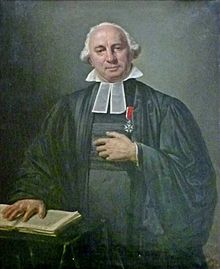Paul-Henri Marron | |
|---|---|
 Paul-Henri Marron, the first pastor of the Reformed Church in Paris | |
| Born | April 25, 1754 |
| Died | July 31, 1832 (aged 78) |
| Education | Academy of Leyden |
| Occupation | Pastor |
| Years active | 1775-1832 |
| Church | Reformed Church of France |
| Ordained | 1774 |
| Writings | Paul-Henri Marron à la citoyenne Hélène-Marie Williams |
Congregations served | Walloon church of Dordrecht (1775-82), Dutch embassy in Paris (1782-88), Saint-Louis-du-Louvre (1790-1811), l'Oratorie du Louvre (1811-32) |
| Title | Pasteur |
Paul-Henri Marron was the first Reformed pastor in Paris following the French Revolution. Born in the Netherlands to a Huguenot family, Marron first came to Paris as the chaplain of the Dutch embassy. Protestants in France had been prohibited from worshipping openly since the Revocation of the Edict of Nantes in 1685. The Edict of Tolerance in 1787 gave non-Catholics the right to openly practice their religion. Marron was recruited to lead the newly tolerated Protestant community of Paris, a task he accomplished through the French Revolution, several imprisonments, the Napoleonic Wars, the Bourbon Restoration and into the July Monarchy.[1]
- ^ "Marron, Paul Henri". McClintock and Strong Biblical Cyclopedia.